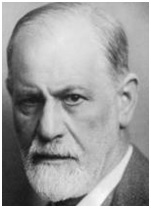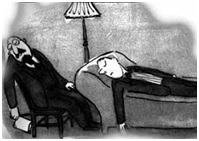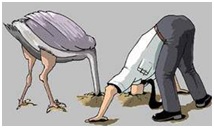|
 |
|
 |
Sigmund Freud - Psychoanalysis and Sex
Sigmund Freud (1856-1939)
Austrian psychiatrist and founder of psychoanalysis (see point one below). Controversial because of his emphasis on sex.
His most famous book is... The Interpretation of Dreams (1913) that says our dreams indicate what’s in our unconscious mind.
What did he teach us?
1. Psychoanlysis This aims to solve your psychological problems (anxiety, guilt, aggression, etc.) through:
a) interpretation of your dreams (the key to your unconscious mind - see point 2) Every dream enacts one of your desires
b) “free association” Analysis and discussion of your thoughts with a psychoanalyst, whilst relaxing on a couch - see point 3
2. Your mind matters To be free from anxiety and other mental problems, you must balance the three parts of your mind (or psyche), the id, superego and ego:
a) id Unconscious, inborn, selfish desires (particularly sex), which you want to satisfy immediately (the “pleasure principle”). Maturer people delay satisfaction of their desires so they can get on with life (the “reality principle”). b) superego Your conscience and morality, telling you what’s right or wrong.
c) ego Your conscious self - what you consider to be you! The ego tries to reconcile desires (id) and conscience (superego). Failure to do so will result in guilt and anxiety, unless avoided by defence mechanisms (a concept later developed by his daughter, Anna Freud, pictured right - see point 3). You must also confront and overcome repressed emotions and memories (called catharsis) - see point 3.
3. Defence mechanisms These are:
a) repression Locking up your bad thoughts and feelings in your unconscious, sometimes causing;
b) denial Denying reality and your problems.
c) displacement Taking out your problems on:
d) sublimation Using unacceptable impulses (e.g. fear and aggression) in an acceptable way (e.g. sport).
e) projection Attributing your unacceptable behaviour to others e.g. an aggressive person accusing others of aggression.
f) intellectualization (or isolation) Detaching yourself emotionally from a painful memory or event. g) rationalization Shifting the blame for a problem from yourself to other things or people.
h) regression Reverting back to earlier behaviour e.g. adults acting like children.
i) introjection (or identification) Tackling your emotional weaknesses by using other people's strengths. j) fantasy (daydreaming) Imagining something nice.
k) reaction formation Doing the opposite of what you want to be.
4. Sex is supreme The libido is your sex drive which is the cause of most of your behaviour. The main aim of psychoanalysis is to
To do this Freud laid his patients on a couch without looking at them, so they could talk
about their real feelings without embarrassment.
5. Transference is important This describes the transfer of childhood feelings (particularly from parents and siblings) into adult
life. For example:
6. Importance of childhood Your personality is largely developed through:
To be happy you must:
7. The Oedipus complex This is the repressed, unconscious desire to:
This causes much guilt. Freud named it after the Greek mythical character, Oedipus, who inadvertently killed his father and married his mother. 8. Don't be selfish The enemy of mental health is self-absorption (or narcissism), where your life is totally centred on yourself. To illustrate this Freud uses the story in Greek mythology of Narcissus, who fell in love with his own reflection.
9. Religion is rubbish Religion is an illusion, created for social order and making life easier.
Key quotes on motivation All that matters is love and work We are our desires.
Key quote on empowerment and freedom Most people do not really want freedom, because freedom involves responsibilities and most people are frightened of responsibility.
Key quote on God and religion Religion is an illusion.
Key quote on happiness Look first into the depths of your own soul and know yourself.
Key quotes on psychology Anatomy is destiny. The interpretation of dreams is the royal road to a knowledge of the unconscious activities of the mind. |
|
|
||
|
|
|
||
|
||
| Copyright © wisdomtowin.com All Rights Reserved | ||
|














